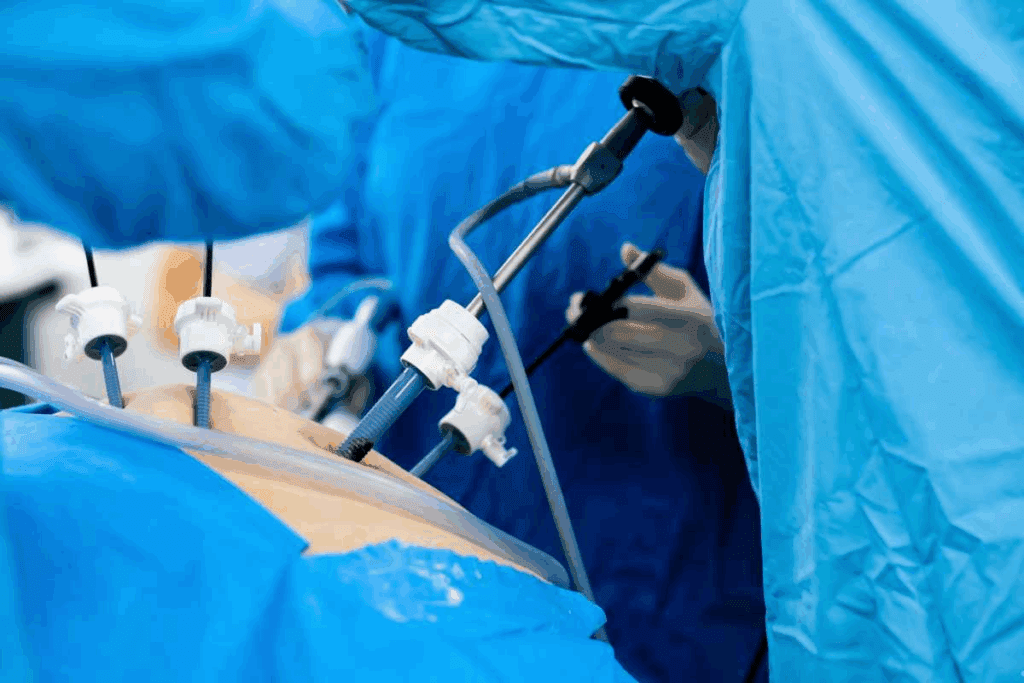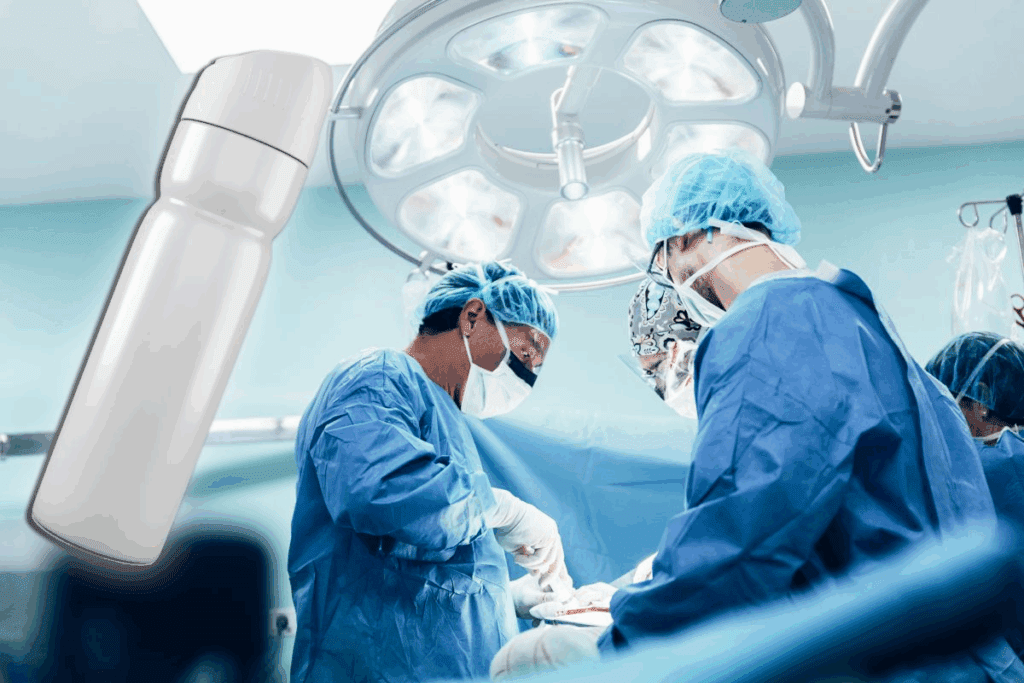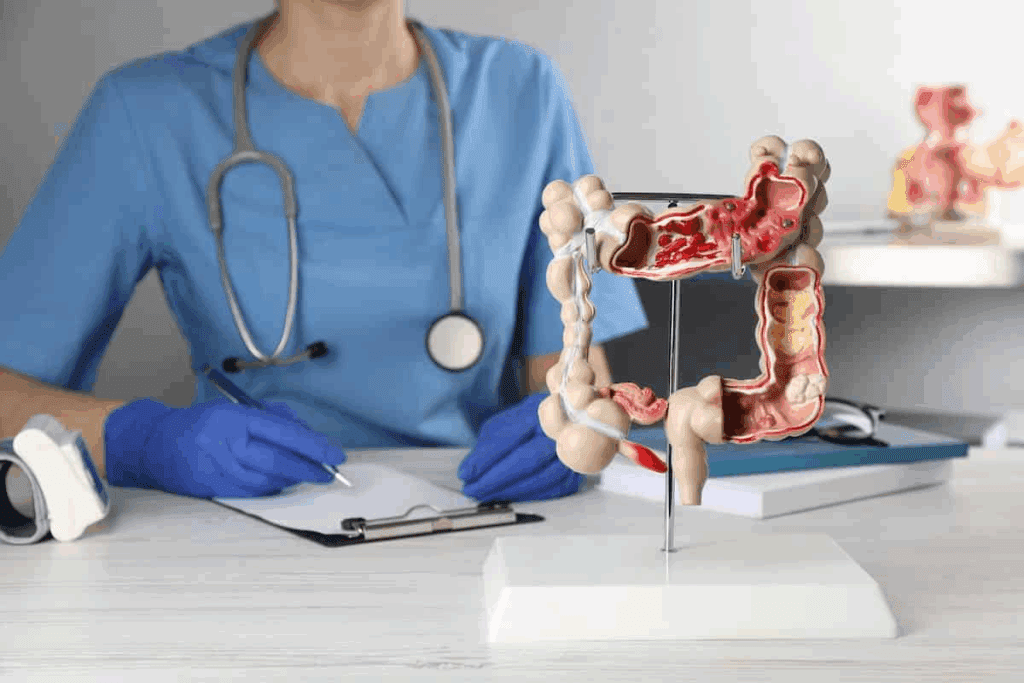
Worries about anus and rectum issues can be really tough. Knowing about surgical help is key. Anorectal surgery offers many treatments to ease these problems and boost life quality. Your ultimate guide to anorectal surgery. Learn about common procedures, finding the right specialist, and what to expect during recovery.
Liv Hospital is a trusted place for anal procedures. They help from start to finish. It’s important for patients to know about the treatments, the doctors, and how to get better.
Key Takeaways
- Anorectal surgery includes various procedures to address conditions affecting the anus and rectum.
- Expert care is available at specialized institutions for complex anal procedures.
- Understanding the diagnosis, treatment, and recovery process is vital for patient care.
- Specialists play a key role in finding solutions that fit each patient.
- Recovery times can change based on the surgery and the patient’s health.
Understanding Anorectal Surgery and Its Importance

Anorectal surgery treats problems in the anus and rectum. These issues can really affect a person’s life. So, it’s key to know about anorectal surgery.
Definition and Scope of Anorectal Surgery
Anorectal surgery fixes diseases in the anus and rectum area. It includes treatments for hemorrhoids, anal fissures, and rectal prolapse. The surgery range is wide, from simple to complex.
| Condition | Surgical Procedure | Purpose |
| Hemorrhoids | Hemorrhoidectomy | Removal of hemorrhoids |
| Anal Fissures | Fissurectomy | Relief of pain and promotion of healing |
| Rectal Prolapse | Rectopexy | Correction of rectal prolapse |
The Significance of Anorectal Health
Keeping the anorectal area healthy is essential. Problems here can cause a lot of pain and issues. Surgery helps fix these problems, making life better for patients. Seeing an anal specialist is a first step to solving these issues.
Knowing how important anorectal health is and how surgery helps is key. It helps people get medical help on time. This knowledge helps them make better health choices.
Anatomy and Function of the Anorectal Region

Understanding the anorectal region is important. It includes the anus and rectum. These parts help us stay comfortable and maintain control over our bowel movements.
Normal Structure of the Anus
The anus is the end of our digestive system. It’s surrounded by muscles and covered in mucous membranes. Its structure is key to controlling when we pass stool.
The anal sphincters, both internal and external, work together. They help us control our bowel movements.
Anorectal Meaning and Physiological Function
The term “anorectal” means the anus and rectum together. This area is vital for controlling bowel movements and supporting the pelvic area. The anorectal region’s function involves muscles, nerves, and blood vessels working together.
This teamwork helps us have normal bowel movements and stay continent.
Common Conditions Requiring Anorectal Surgery
Many anorectal conditions can greatly benefit from surgery. These issues often cause a lot of discomfort. If not treated, they can lead to serious problems.
Hemorrhoids and Their Complications
Hemorrhoids are swollen veins in the lower rectum or anus. They can cause pain, itching, and bleeding. If they get worse, they might need to be surgically removed.
Anal Fissures and Chronic Cases
Anal fissures are tears in the anus lining, causing pain and bleeding. If they don’t heal with simple treatments, surgery might be needed.
Abscesses and Fistulas
Anorectal abscesses are pus collections that cause severe pain and swelling. Fistulas are abnormal connections between the anus and skin. Both often need surgery to drain or repair.
Rectal Prolapse and Anorectal Dysfunction
Rectal prolapse happens when the rectum loses its attachments, causing it to bulge out. This, along with other anorectal issues, can greatly affect your life. Surgery might be needed to fix it.
| Condition | Symptoms | Complications | Surgical Intervention |
| Hemorrhoids | Pain, itching, bleeding | Thrombosis, strangulation | Hemorrhoidectomy |
| Anal Fissures | Pain, bleeding during bowel movements | Chronic pain, infection | Lateral sphincterotomy |
| Abscesses and Fistulas | Pain, swelling, discharge | Recurrent infections, abscess formation | Drainage, fistulotomy |
| Rectal Prolapse | Protrusion of the rectum, incontinence | Strangulation, ulceration | Rectopexy, resection |
Types of Anorectal Surgical Procedures
Anorectal surgery includes many procedures to fix problems with the anus and rectum. These surgeries are key for treating issues that really affect a person’s life quality.
Analectomy: Removal of the Anus
Analectomy is when the anus is removed. It’s usually done for severe anal cancer or when the anus can’t be fixed. This surgery is very complex. It often means removing the anal canal and creating a permanent colostomy.
Anoplasty: Surgical Repair of the Anus
Anoplasty fixes the anus by repairing damage or deformities. This can happen due to birth defects, injuries, or diseases. The goal is to make the anus work right again, improving the patient’s life.
Hemorrhoidectomy and Modern Alternatives
Hemorrhoidectomy removes hemorrhoids when other treatments don’t work. Today, there are less invasive options like rubber band ligation and sclerotherapy for hemorrhoids.
Fistulotomy and Fistula Repair
Fistulotomy opens a fistula, an abnormal connection between the anus and skin. Fistula repair aims to close this tract. It uses advanced methods like flap procedures or fistula plugs.
| Procedure | Indications | Outcomes |
| Analectomy | Severe anal cancer, irreparable anal damage | Removal of diseased tissue, possible colostomy |
| Anoplasty | Congenital defects, trauma, disease | Restoration of anal anatomy and function |
| Hemorrhoidectomy | Failed conservative management of hemorrhoids | Removal of hemorrhoids, symptom relief |
| Fistulotomy/Fistula Repair | Anal fistulas | Closure of fistula, healing of tract |
Reconstructive Anorectal Surgery Techniques
Reconstructive anorectal surgery helps people with birth defects or injuries to the anus. It has made big strides, giving hope to those needing complex repairs.
Anal Reconstructive Surgery After Trauma
Accidents or surgery mistakes can hurt the anus. Anal reconstructive surgery is key to fix this. It makes the area work and look right again.
These surgeries need special skills and tools. They use advanced materials to mend damaged areas.
Anus Plastic Surgery for Congenital Defects
Birth defects in the anus area are tough to fix. Anus plastic surgery is designed to solve these problems. It aims to make the anus work better and look good.
Fixing these defects can greatly improve life. The success of anal reconstruction depends on the surgeon’s skill and new technology. As surgery gets better, so does life after it.
Specialists Who Perform Anorectal Surgery
For anorectal surgery, finding the right specialists is key. They ensure the best care and results. Anorectal surgery includes many procedures that need skill and knowledge of the area.
Colorectal Surgeons: Training and Expertise
Colorectal surgeons are experts in the colon, rectum, and anus. They can diagnose and treat issues like hemorrhoids and rectal prolapse. They also do complex surgeries to fix problems and improve function.
Anal Specialists and Their Focus Areas
Anal specialists deal with problems like anal fissures and abscesses. They know a lot about the anal area. This lets them offer treatments that work well for each patient.
Anal Fissure Specialists: When to Consult
Anal fissure specialists help with tough cases of fissures. They can decide if surgery is needed. Seeing one is a good idea if treatments don’t work or if symptoms get worse.
Specialized Facilities for Anorectal Procedures
Anorectal procedures need special facilities for the best results. These places have the newest technology and teams with lots of experience in anorectal care.
Anal Hospitals and Specialized Centers
Anal hospitals and special centers offer full care for anorectal surgery patients. They have teams with doctors, nurses, and support staff ready for complex cases.
Going to these centers means you get the latest tools and treatments. This can really help your recovery.
Advanced Equipment and Technology
Top-notch equipment and tech are key for anorectal success. These facilities have the latest in imaging and surgery tools.
| Equipment/Technology | Description | Benefit |
| High-Resolution Imaging | Detailed imaging for accurate diagnosis | Improved diagnostic accuracy |
| Minimally Invasive Surgical Tools | Less invasive procedures reducing recovery time | Faster recovery, less pain |
| Advanced Monitoring Systems | Real-time monitoring during and after surgery | Enhanced patient safety |
Preparing for Your Anorectal Surgery
Getting ready for anorectal surgery takes a few important steps. Knowing these steps can make you feel less anxious. It helps make sure you’re ready for your surgery.
Initial Consultation and Assessment
The first meeting with your surgeon is key. They will check your condition, talk about the surgery, and what you can expect. This is your chance to ask questions and learn about the surgery’s risks and benefits.
Diagnostic Tests and Imaging
Tests and scans are needed to confirm your diagnosis and plan the surgery. You might have colonoscopy, MRI, or CT scans. These help the surgeon tailor the surgery to your needs.
Pre-operative Instructions
Following the pre-operative instructions is very important. You might need to stop certain medications, avoid eating or drinking before surgery, and prepare your bowel for the procedure. Sticking to these instructions can greatly improve your surgery’s success.
Recovery and Rehabilitation After Anorectal Surgery
Anorectal surgery recovery is complex. It includes post-operative care, pain management, and lifestyle changes. A smooth recovery is key for surgery success and getting back to normal.
Immediate Post-Operative Care
Immediate care after surgery is critical. Patients are watched in a recovery room for hours. Close monitoring by doctors helps catch and fix any issues right away.
Pain Management Strategies
Managing pain is important after surgery. Patients get pain relief medications to ease discomfort. Sitz baths also help with pain and healing.
Dietary Modifications for Optimal Healing
Eating right is key to recovery. A high-fiber diet and staying hydrated prevent constipation. It’s important to avoid straining when you go to the bathroom.
Returning to Normal Activities
It’s good to slowly get back to normal. Avoid heavy lifting and hard activities for a few weeks. Follow-up appointments with doctors help track healing and guide you back to normal life.
Following post-operative instructions and making lifestyle changes helps ensure a good recovery after anorectal surgery.
Advancements in Anorectal Surgery
New surgical techniques have changed how we treat anorectal issues. Now, patients have better and less invasive options. These changes have greatly improved their lives and health.
Minimally Invasive Techniques
Minimally invasive methods are key in anorectal surgery. Laparoscopic surgery and transanal minimally invasive surgery (TAMIS) cut down on recovery time and scarring. A study in the Journal of Surgical Research found that laparoscopic surgery reduces hospital stays and pain after surgery.
Multidisciplinary Approaches to Treatment
Doctors from different fields work together for better care. This team effort means patients get care tailored to their needs. It leads to better results for everyone.
Improved Patient Outcomes and Quality of Life
New surgery methods have made a big difference. Patients now have shorter recovery times, less pain, and can get back to their lives faster. A top colorectal surgeon said, “The future of anorectal surgery is all about innovation and focusing on the patient.”
Conclusion
Anorectal surgery treats many issues in the anus and rectum. It’s key to know about anorectal health and the surgery options. This is important for those looking for medical help.
Specialists play a big role in anorectal surgery. Colorectal surgeons and others use their skills to diagnose and treat. They help patients get the best results from anorectal surgery.
The recovery after surgery is very important. Patients should follow their doctor’s instructions and go to follow-up visits. This helps avoid problems and makes recovery smoother.
New advancements in anorectal surgery have made a big difference. Techniques like minimally invasive surgery and reconstructive methods have improved lives. These changes have made treatment better for many people.
As technology keeps getting better, anorectal surgery will likely get even more effective. This means more hope for those with anorectal issues. Staying up-to-date and talking to experts can help make the right choices for care.
FAQ
What is anorectal surgery?
Anorectal surgery treats problems in the anus and rectum. This includes issues like hemorrhoids, fissures, abscesses, fistulas, and prolapse.
What is the significance of anorectal health?
Good anorectal health is key for comfort and control. Problems here can really hurt your life quality. So, getting the right treatment quickly is very important.
What are the common conditions that require anorectal surgery?
Many issues need anorectal surgery. These include hemorrhoids, fissures, abscesses, fistulas, and prolapse. Without treatment, they can cause a lot of pain and other problems.
What are the different types of anorectal surgical procedures?
There are many types of anorectal surgery. These include analectomy, anoplasty, hemorrhoidectomy, and fistulotomy. The right procedure depends on the problem and the patient’s health.
What is reconstructive anorectal surgery?
Reconstructive surgery fixes problems after trauma or birth defects. It helps improve a patient’s life quality a lot.
Who performs anorectal surgery?
Specialized surgeons do anorectal surgery. These include colorectal and anal specialists. They have the skills to handle complex cases.
What are the benefits of seeking treatment at a specialized anal hospital or center?
Specialized centers have the latest technology for better care. They offer a full treatment plan, from start to aftercare.
How should I prepare for anorectal surgery?
Preparing for surgery means a first visit, tests, and instructions. Following these steps is key for a good outcome.
What can I expect during the recovery process after anorectal surgery?
Recovery includes care right after surgery, managing pain, diet changes, and getting back to normal. Knowing these steps helps with recovery.
What advancements have been made in anorectal surgery?
New techniques and treatments have improved surgery. These advancements offer better results and less pain for patients.
What is anorectal dysfunction?
Anorectal dysfunction is when the anus and rectum don’t work right. This can cause symptoms like incontinence, constipation, or pain.
What is anal reconstruction surgery?
Anal reconstruction fixes the anus after trauma or birth defects. It aims to restore normal function and look.
References
Arezzo, A., Podzemny, V., Pescatori, M., & Allaix, M. E. (2019). Surgical management of haemorrhoids – state of the art. Langenbeck’s Archives of Surgery, 404(1), 11–21.https://www.ncbi.nlm.nih.gov/pmc/articles/PMC6400921/



































